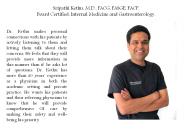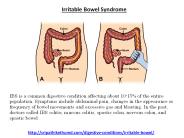Sripathikethumd PowerPoint PPT Presentations
All Time
Recommended
Helicobacter pylori (H pylori) infection is very common, affecting approximately 2/3 of the world’s population at one time or another. In the US, H pylori is more prevalent in the older adults, African American’s, Hispanics and Asians.
| PowerPoint PPT presentation | free to download
The most common reason for peptic ulcer disease is an infection caused by a bacteria called H pylori. The second most common reason for the ulcers is long-term use of nonsteroidal anti-inflammatory medications such as aspirin, ibuprofen (Advil, Motrin, etc.), naproxen (Aleve), etc. Peptic ulcer is not caused by stress or spicy foods! For more info, please visit at http://sripathikethumd.com/digestive-conditions/peptic-ulcer
| PowerPoint PPT presentation | free to download
Dysphagia is the medical term for “difficulty swallowing”. This difficulty can be food not going down easily, pain when swallowing, coughing or gagging while swallowing, feeling as if the food is sticking in the throat or chest, etc. Any kind of difficulty swallowing needs immediate evaluation as it could be a sign of more serious problem. For more info, please visit at http://sripathikethumd.com/symptoms/difficulty-swallowing
| PowerPoint PPT presentation | free to download
Gastroesophageal reflux disease (GERD) or simply called acid reflux or heartburn, easy condition where acid from the stomach flows backward up into the esophagus. For mored etails you can visit at
| PowerPoint PPT presentation | free to download
The most definite way to diagnose peptic ulcer is by a barium x-ray or upper endoscopy. Sometimes, if you have very convincing symptoms of an ulcer, I may test you for the H pylori bacteria and may treat you with ulcer medications before doing any other tests.
| PowerPoint PPT presentation | free to download
IBS is a common digestive condition affecting about 10-15% of the entire population. Symptoms include abdominal pain, changes in the appearance or frequency of bowel movements and excessive gas and bloating. In the past, doctors called IBS colitis, mucous colitis, spastic colon, nervous colon, and spastic bowel.
| PowerPoint PPT presentation | free to download






